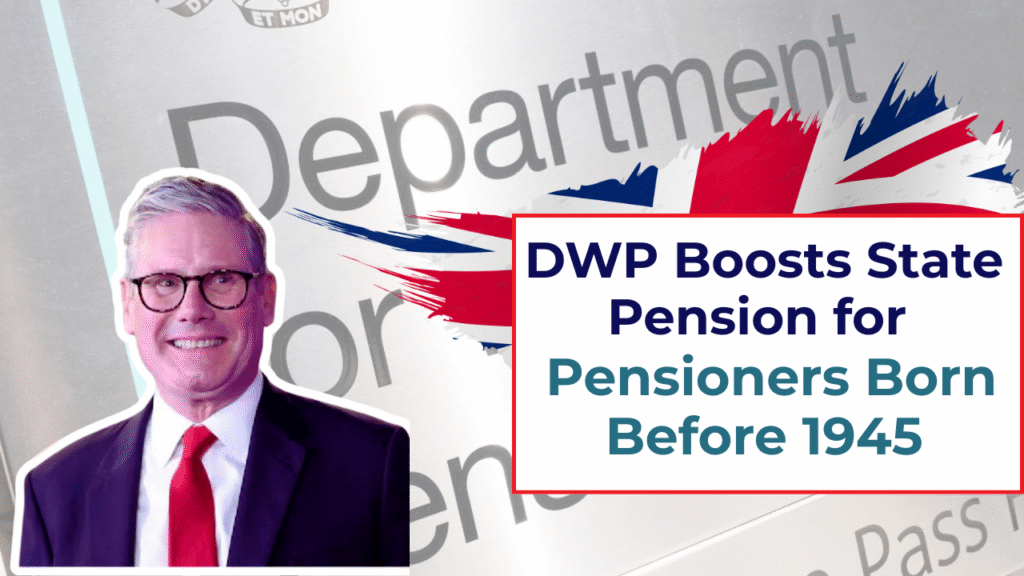Thousands of Elderly Britons Set to Receive Higher Payments
Pensioners born before 1945 are receiving a notable boost in their State Pension payments, according to the latest updates from the Department for Work and Pensions (DWP). This increase is part of the Government’s regular pension uprating and is most beneficial to older pensioners who qualify for the basic State Pension, which has seen a substantial rise this year.
The boost, which came into effect from April 2025, reflects the UK Government’s ongoing commitment to the Triple Lock policy a mechanism designed to ensure that the State Pension keeps pace with the cost of living.
What Is the Triple Lock?
The Triple Lock guarantees that the State Pension will rise each year in line with the highest of three measures:
- Average earnings growth
- Inflation (as measured by the Consumer Prices Index)
- 2.5%
For the 2024–2025 financial year, pensions increased by 8.5%, which reflects the rise in average earnings. This means that pensioners will now receive significantly more each week compared to last year.
Who Benefits the Most?
Pensioners Born Before 1945
Those born before 6 April 1945 typically receive the basic State Pension, a system introduced before the newer new State Pension was rolled out in 2016.
For the 2024–2025 financial year, those on the full basic State Pension will now receive £169.50 per week, up from £156.20 the previous year. This equates to an annual income of approximately £8,814 from the State Pension alone.
By contrast, those on the new State Pension (typically men born after 6 April 1951 and women born after 6 April 1953) now receive £221.20 per week, up from £203.85 equating to around £11,502 per year.
While the newer system pays more in total, older pensioners under the basic scheme are now catching up with this year’s substantial increase.
Why Are Older Pensioners Receiving a Boost Now?
The increase in the basic State Pension aligns with both the Triple Lock commitment and a growing concern over the financial vulnerability of elderly pensioners, particularly those who are in their 80s or 90s and often rely solely on the State Pension for their income.
Many of these individuals did not benefit from workplace pensions in the way later generations have, making them more dependent on government support in retirement.
Additional Benefits for Older Pensioners
In addition to the State Pension increase, pensioners may also be eligible for other financial support:
1. Pension Credit
A benefit aimed at low-income pensioners, Pension Credit tops up income to a minimum threshold. For single pensioners, this is now £218.15 per week, and for couples, £332.95 per week.
2. Winter Fuel Payment
Pensioners can also receive up to £600 to help with energy bills during the colder months. This includes a standard Winter Fuel Payment and a temporary Pensioner Cost of Living Payment.
3. Free NHS Services
Older pensioners also qualify for a range of free NHS services, including prescriptions, eye tests, and dental treatment depending on income and benefit status.
How to Check Your State Pension
The DWP offers an online service for individuals to check their State Pension forecast. This includes:
- How much you can expect to receive
- When you can start receiving it
- How to improve your forecast (if eligible)
You’ll need to sign in using your Government Gateway ID to access this service.
Public and Political Response
The 8.5% increase has been largely welcomed by pensioner advocacy groups. Many note that it’s a necessary adjustment, especially given the rising costs of food, energy, and healthcare.
However, some critics argue that the Triple Lock is becoming unsustainable and creates an imbalance between working-age benefits and pensioner incomes. The Government, however, has committed to maintaining it at least through the next election cycle.
Future Considerations
As the UK continues to grapple with an ageing population and the economic pressures of pension funding, debates about the longevity of the Triple Lock are expected to intensify.
While this year’s rise is a positive development for older pensioners, long-term reforms may be needed to ensure fairness and sustainability for future generations.
Summary
Pensioners born before 1945 have seen a meaningful rise in their weekly State Pension payments due to the Government’s Triple Lock policy and growing concerns about pensioner poverty.
With weekly payments now reaching £169.50 for those on the full basic State Pension, the increase is providing crucial support at a time of high living costs.
Older pensioners are also eligible for additional benefits, including Pension Credit, Winter Fuel Payments, and free NHS services.
Those unsure about their entitlement or how much they should be receiving are encouraged to use the DWP’s online tools or contact the Pension Service directly.




